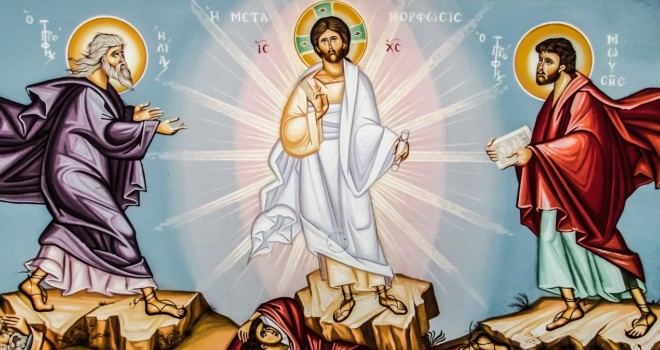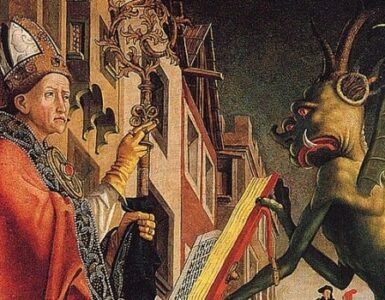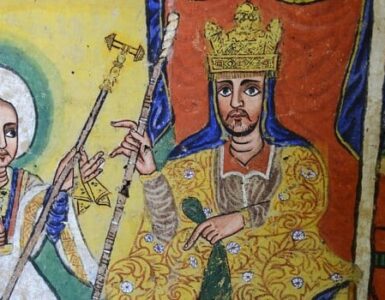At the Transfiguration, God told the apostles: “This is My chosen Son; listen to Him.” Why did they need this Divine exhortation?
Gospel (Read Lk 9:28b-36)
St. Luke tells us about a most extraordinary episode in today’s Gospel. We know it as the Transfiguration, when Jesus was temporarily revealed to Peter, James, and John (and through them, later, to us) in His glory—“dazzling white” light in His face and clothing. His humanity wasn’t blotted out; rather, it was changed in a way the apostles had never seen. In addition, Jesus received a visit from Moses and Elijah, who also appeared in glory. We know from Scripture that Elijah did not die but was assumed into heaven (see 2 Kings 2:11). We also know there was a strong Jewish tradition that Moses, too, was assumed into heaven. See how Josephus, a first century A.D. Jewish historian, wrote about this:
Now as soon as they [Moses, Joshua, Eleazar the high priest, and the seventy elders] were come to the mountain called Abarim, he dismissed the senate; and as he was going to embrace Eleazar and Joshua, and was still discoursing with them, acloud stood over him on the sudden, and he disappearedin a certain valley, although he wrote in the holy books that he died [cf. Deut. 34:6-7], which was done out of fear, lest they should venture to say that, because of his extraordinary virtue, he went to God (Josephus, Antiquities 4.325-26).
How otherworldly for Jesus to receive these visitors! In all the rest of His public ministry, there is nothing quite like this. No wonder Peter was at a loss for words.
Why did it happen? First, we might ask if God sent Moses and Elijah, who represent the whole of Israel’s Old Covenant history (the Law and the Prophets) to encourage Jesus in the difficult path that lay ahead for Him. See that they “spoke of His exodus that He was going to accomplish in Jerusalem.” The “exodus” wasn’t geographical. Jesus wasn’t going to lead His people out of Judah to a new country. Rather, He was going to pass through a horrific death to the glory of His Resurrection, liberating all people from bondage to sin and death. Did the appearance of Moses and Elijah steady His resolve and stir up His courage?
Then, of course, we wonder about the effect this episode—the glorious bodies, the Voice from heaven—had on the apostles. They were able to see and hear for themselves that Jesus had power and authority far beyond anything they could have imagined. They were going to need this conviction to keep them steady in what lay ahead, too. They would have to watch the Master be arrested, brutalized, and crucified in shame. They needed to know, beyond any question, that His fate in Jerusalem was one He willingly accepted. They would be tempted to think the plan had failed, that the mission of the Messiah had been tragically aborted. They would need to keep that Divine exhortation in their ears: “This is My chosen Son; listen to Him.”
So, at least one of the reasons for the Transfiguration is that it was meant to be a lesson in faith. The apostles at that moment, as it was unfolding, didn’t really need faith. They saw and experienced a glimpse of the life of the world to come. For a fleeting moment, they could see things as they really are. The veil would, of course, return. In Jerusalem, they would see and experience events that would radically call into question what they had seen on the mountain. Where would they take their stand? What would faith require of them?
The apostles passed through their ordeal to discover that Jesus is, indeed, God’s chosen Son, full of glory and power. The death He suffered wasn’t because of failure. It was His victory—for us. The apostles became His eyewitnesses, declaring to us what they saw and knew. We, of course, continually face the same test of faith. When life tempts us to fear that the Messiah’s mission has somehow been thwarted or aborted, either in the world or in our own lives, will we have the faith to believe the witness of the apostles? Will we have an unshakable confidence that Jesus has conquered the world? Will we continue to trust Him when He willingly chooses to cloak His victory in weakness?
Aren’t we thankful the Church gives us the season of Lent to examine ourselves this way?
Possible response: Lord Jesus, please help me retain this vision of Your glory when I am tempted to doubt You.
First Reading (Read Gn 15:5-12, 17-18)
To understand this reading, we benefit from knowing its immediate context. This conversation God had with Abram was prompted by the fact that although Abram had obeyed God and traveled to the land of Canaan on the strength of His promises to build a nation from his descendants, no child had yet been born, and about ten years had passed. Abram’s confidence was beginning to fray.
Instead of giving Abram a timetable of when he could expect the birth of a son, God took him outside for a nature lesson: “Look up at the sky and count the stars, if you can. Just so … shall your descendants be.” Why did God direct Abram’s attention to the night sky? Was it because it is impossible to see the magnificence of the sparkling stars filling it to infinity without also thinking about the power and wisdom that placed them there? If Abram looked at the stars for awhile, maybe even all night, did their existence become visible proof to him that God was perfectly capable of keeping His promise?
Yes, it seems to have worked that way. Abram’s vision of God’s glory that he could see in nature enabled him to believe in the birth of a son—somehow, someday (it took another fifteen years!). He got a lesson in faith that night, and it deeply pleased God: “Abram put his faith in the Lord, Who credited to him as an act of righteousness.” Here, it was natural glory that led to faith; in the Gospel, it was supernatural glory that was meant to lead to faith, too. We can’t miss the point. We are to let what our eyes can see (either our own eyes or the witness from the eyes of others) help us put our faith in God for what we can’t see now.
In Lent, this is just the kind of lesson we need.
Possible response: Heavenly Father, keep my eyes open to the evidence of Your goodness when blindness overtakes me.
Psalm (Read Ps 27:1, 7-9, 13-14)
On a Sunday when our readings call us to faith, what would we want to sing in our responsorial psalm? “The Lord is my light and my salvation.” This psalm is a robust profession of faith when fear tempts us to doubt: “The Lord is my life’s refuge; of whom shall I be afraid?” It reminds us to put our trust in what we can’t now see rather than what we can: “I believe that I shall see the bounty of the Lord in the land of the living.” Sometimes (often, actually), our faith will require us to be patient: “Wait for the Lord with courage; be stouthearted, and wait for the Lord.” Can there be a better poem to teach us faith?
Possible response: The psalm is, itself, a response to our other readings. Read it again prayerfully to make it your own.
Second Reading (Read Phil 3:17-4:1)
St. Paul reminds us that in the midst of this earthly life, living among people whose “minds are occupied with earthly things,” our true “citizenship is in heaven.” We must remember that this temporal existence is not all there is (the lesson Peter, James, and John learned in our Gospel). We are waiting for the same kind of glory into which Moses and Elijah entered. Do we see it now? No, we don’t, except for fleeting glimpses in the lives of the saints. Still, we know that glory exists and that it is our destiny, if we “stand firm in the Lord.”
Faith, which is often so difficult for us now, will have its reward. Will we, with God’s help, persevere?
Possible response: Lord Jesus, help me stand firm in my heavenly citizenship as I make my way on earth through Lent.












